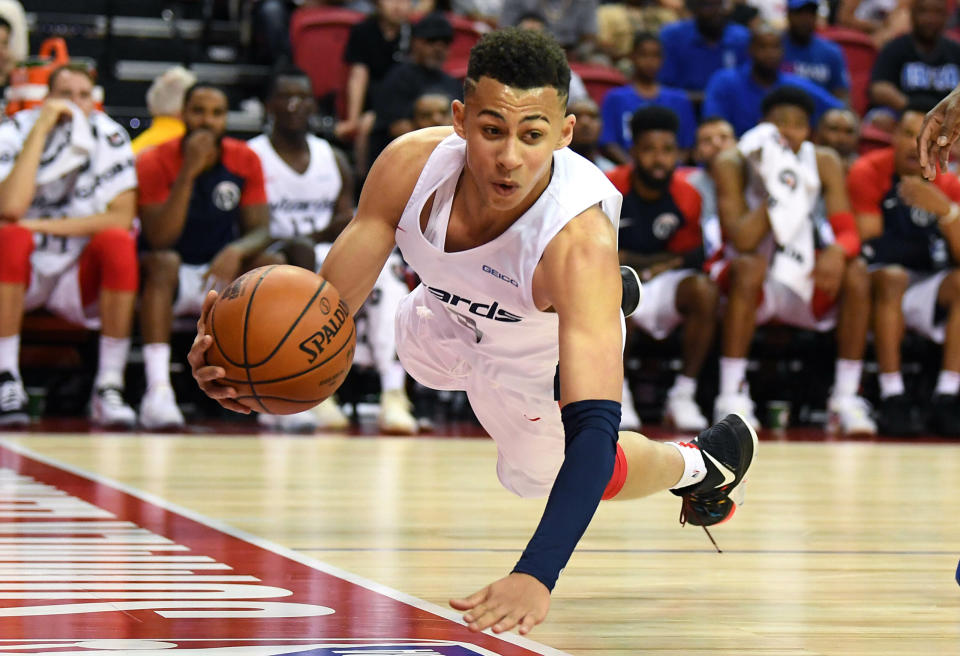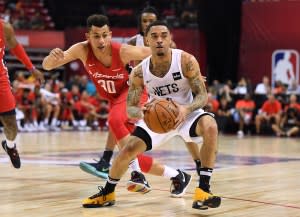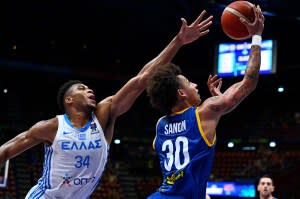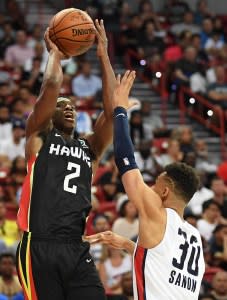Ukraine’s Issuf Sanon: ‘I literally saw missiles flying by my window’

Issuf Sanon, a Ukrainian basketball talent eyeing the NBA, has faced challenges from war to relocation. He caught NBA scouts’ attention after a standout performance at the 2017 FIBA Europe Under-18 Championship, leading the Washington Wizards to draft him 44th overall in 2018. Sanon played in Washington’s Summer League before moving through Eastern European clubs.
Recently, the war in Ukraine forced him to confront bombings near his home, pushing him to relocate and join a team in the Latvian-Estonian Basketball League. Speaking with HoopsHype, Sanon shared the effects the war has had on him, how he has developed as a player, and why he believes his game is better suited for the NBA.
What was it like being a black kid growing up in Ukraine?
Issuf Sanon: When I was growing up, it was a little bit difficult for me because, when you’re a small kid and in my city, there weren’t a lot of black kids. So, all of them were like pointing out my differences for jokes. I mean, some of them were really friendly and I wanted to join in, but some of them, like [most] kids, they just don’t understand why I’m like that. So yeah, it was a little bit annoying. And of course, I had some weird situations in school when they were calling me names and I had to deal with it.
You have been playing professionally for eight years in Europe, played with the WIzards' Summer League team, how have you adjusted mentally having recently turned 24?
IS: I never felt like I was playing with older guys, because from there, I think from like 15 or 14, I was already playing with them. I never felt that transition from small basketball to big basketball. But for sure, when I came to the United States, it was really different, it was new for me, compared to European basketball when I came from Dnipro to Slovenia.
But, it was still the same basket. When I came to the USA, this really opened my eyes because the basketball there is so different. It’s more physical, more fast-paced. All the guys can really go with you. They like to play on-ball all the time. Everybody can shoot, everybody can go. So you see the difference all the time.
Due to the war in Ukraine you switched leagues, you went from playing with the Dnipro in the Ukrainian League to the Estonian League, how has that change been for you?

IS: I mean, I think the Ukrainian League was a little bit better. I play in Eurocup, just a lot in the Estonian League. So for sure, for me, it’s really nice to play in the Eurocup but with the Estonian club, it’s not really a [high] level but at least it’s something.
As a Ukrainian basketball player, were Svi Mykhailiuk and Alex Len big role models for you?
IS: Yeah, when I grew up, I grew up watching my teammates now Alex Len and then it’s Svi Mykhailiuk. When I was a kid, they were big superstars for me. When I was a kid, I was coming to the games and my coach was always telling me, if we play defense on the guy [like them].
So, when I came to the National Team and when I first met them, I was like [starstruck]. I was talking to them, a lot of their friends and their teammates.
When I was a kid, I was watching how they play, I wanted to be with them. I was saying to the guys, “I want to play with them.” So, now when I see that it is real, it’s crazy and it really [blew] my mind. I watched these two guys and now we are teammates, it’s really crazy.
How is your life being affected by the war in Ukraine?
IS: I have to say, the events in Ukraine depress and anger me tremendously. Even though I am not currently in Ukraine physically, I feel connected with my heart. My friends and family are there, and there hasn’t been a day when I haven’t thought about them and their safety, and of course, about the people of Ukraine who are facing all those horrible things that Russia does every day.
Being from Donetsk, are you personally affected and is your family affected?
IS: I was 14 years old when my city, Donetsk, faced those terrible events in 2014. My family and I had no other option but to leave because it was impossible to live under constant attacks. So, my mom made the hard decision to send me to a sports school in Dnipro, where I lived for three years, while my older brother moved to Kyiv. Our mom remained in Donetsk for one more year. Since those days, I have never been home.
What is it like being in a country when a war breaks out?
IS: On February 24th, 2022, it was my second time facing war in my country. I was in shock, I couldn’t believe this was even possible. That day left me with a feeling of frustration and helplessness, as the majority of Ukrainian cities were shelled, and I literally saw missiles flying by my window. I would never wish for anyone to experience the sounds of rockets exploding in their city and sirens blaring almost the whole day.
Was it hard finding a new team mid-season?
IS: Considering the fact from the start of the full-scale war, I didn’t train for about a month, so it was hard for me to get into shape both physically and mentally. However, when I started working on it, the team offers [didn’t take too] long [to start] coming in.
You're 24, entering the prime of your career, what are the next steps? Your draft rights were held by Houston, but they released them… Why?

IS: I asked them to release me, so I can really go free. I’m trying to maybe play in the Summer League or whatever is offered to me. But now I’m really focused on the playoffs and finishing the season, which is my goal.
Are you willing to go the G League route and work your way up to a two-way contract or something? Or are you hoping to catch on to a roster during training camp?
IS: It’s really a good question. It’s all about your opportunity. If it’s going to be a good opportunity, I’m coming, whatever is going to be on the table, to the league or training camp. I don’t know, 10 day [contract] or I don’t know, or like just one practice. It’s never going to be enough. And they want to see me. I’m going to do whatever they ask, and I understand that.
What do you think you can offer as a prospect or as a player in the NBA or G League right now? What's your best skill?
IS: I think I can really show how I can defend and execute fast breaks. I can really go coast-to-coast. And for sure, this year my three-point percentage was better than last year.
I know you played with the Wizards during the 2018 and 2019 Summer League. What's something that you learned then and what’s different now that you're older?

IS: I think when I was younger, my mentality was a little bit different. I wasn’t ready, I think, to be out there, I was still a kid.
I was big but I still wasn’t mentally older. And now the mental things are so different, I think now I can really compete with the guys.
Do you think you fit the NBA game better than Europe?
IS: Yeah, all the American guys that come from the USA, they always been telling me this, that in the USA, [it] is [more] my style.
They always tell me go try to [be] unique or something because they all know I like to go out, I love to go coast-to-coast, sometimes I can [chop up on] offense and just go one-on-one because I feel like I can beat my defender. I see his head lowered or I see he is just there and I blow by.
So, yeah. I think over there, it’s my style, but I have to prove it completely.
You had the appendix injury and then you had an ankle injury, how was overcoming those injuries?
IS: No one knew me before this [U-18] tournament, and when I was playing and I played super nice, some people, even in Ukraine, started talking that I look older, that I’m like 24 years old.
And they just changed my birthday because I’m black, too. They said I was from Africa when I was like 15 years old. And, that was a crazy story about me because no one [had] ever heard about me. And I just came from nowhere and people would be like, “You look like 18.”
You know, what was crazy, I think it was Arizona State University or Grand Canyon [University], some of them say that I have fake passports and all of that stuff because they read it [online] or someone told them these kinds of things. I don’t know how this happened but yeah, that is what happened and I don’t know. It was crazy.
Did these injuries hamper your development? You missed a lot of time.

IS: With my ankle, it happened afterward, and I was out for almost two years. It was tough. But, at that time, I wasn’t even ready for this kind of injury because it seemed like a small injury. And the people in Ukraine, they did not have experience with this kind of injury. I was working with people who weren’t familiar with it. So, that’s why I think my rehab was super long because they told me I could go back to the team, and being super athletic, I just started doing my thing and got hurt again. And at that time, I was out for seven months.
I started doing things again and got hurt again, and they told me I needed surgery. So imagine, I was out for seven months, and just two weeks after I started practicing, I got injured again. So after that, I had surgery and was out for almost a year. It was a dark time for me. You know, for the first three months, I was just at home, doing my rehab with some people, and all I could do was watch TV, do stretching twice a day, my rehab, and play video games.
Whenever I watched, all my friends would call me, asking how I was, and we’d talk about basketball. Well, the last time we played, it was like boom, boom, boom. I did very well. And, all that stuff, especially when it was Dnipro playing at home and I was there, it was crazy. For the whole team, it was like, for me, in my eyes, I was better in the game, and they must have been like, “Wait, what are you doing?” You know, like, “Why are you sitting?” So, it was tough, but it is what it is, bro. I went through it, and now everything is good. Everything is nice.
What was the ankle injury that you had that like?
IS: It was a stress fracture. Well, it just happened. So imagine, everybody knows, I’m kind of a funny guy and it was practice and the coach asked us to play five-on-five. And I shot short like that and [when I landed] just started screaming and everybody was like, come on.
Like,”Stop this nonsense.” And I said, “No, no. I’m hurt.” They’re like, “Well, don’t give me this nonsense. We all know, you always joke around.” I’m like, “No, no, I went to the doctor. He checked. He said yes. I can’t even stand.” So I did an MRI.
It just happened, but at the same time, I’ve been telling them that my foot hurt and my foot was really hurting for three months. And I would tell him that and he would always be telling me that I would ice.
And I’d say, “So, you know, like this was the first sign that I have this kind of problem and I need to start working on that because they told me, if I knew it before, I still could do some exercises, and all that stuff, but I was just playing.
Do you think you will surprise people if they saw you play, like you’re a lot more athletic than people give you credit?
IS: We’ll see because, you know, everybody has a different opinion about me being athletic. You know DJ Stephens? He can really jump. He can really dunk so for me, he’s athletic. Like, for me, he’s super light. [However], I don’t know, maybe, I think [I am].
I think I can really impress some people because they’ve never seen me play. And I feel athletic, but I think I’m a bit more athletic than I look like.
My first step is really quick, so I always beat my defender with my first step. My first step is really killing people. And in Europe, they always help because we don’t have this rule for three seconds.
Do you think if you were able to get a Summer League, G -League opportunity, do you just want to show people that?
IS: I just want to show them why I was drafted. It’s nothing more, nothing less, you know. I just want to prove to them that it was not a mistake. A lot of people are just saying that I was drafted was a mistake. So I just want to show them that it’s a good mistake, you know, it’s a good mistake. And they drafted me for a reason, I just want to show them this.
What's one thing that people are going to be surprised by?
IS: My shooting, I think so. I think I can really surprise those who doubt it.
If you can turn back the clock, would have you played college basketball in America instead of going the pro route?

IS: Yeah, I think I was considering that because, in college they give you more freedom, and that’s what I really like about it. So, I think it would be a really good adventure for me,just to have the ball, to have a coach who believes in me, and just to be myself. Just be that guy, routine every day, do some crazy reverse layup or whatever, and put the ball in the basket. I think so. But, I had the opportunity to go to Olimpia. They helped me a lot, they really taught me English, which is how I speak now. I know it’s not perfect, but it’s something, you know, at least something. So I really appreciate it.
How was playing in Slovenia?
IS: It was cool, you know, because for me, it was a different country for sure. When I was 18, it was difficult for me because I played in the Slovenian League, for KK Cedevita Olimpija. We won the Slovenian League. You know, it’s two different levels. I was playing in Ukraine, for like eight minutes a game. And then I come and I play, like in the Champions League, 25 minutes a game. For a young kid, it was really interesting. But at the same time, I didn’t know English, so it was really bad to communicate with me on the floor because the guys were telling me, just go make a screen or just to defend or something. And I got annoyed, I didn’t know, like, what’s up? I couldn’t ask, “You know what I want? What are you asking me? What do you want me to do next?” So for the first three months, there was Google, and I was always using Google Translate. So yeah, it was really difficult.
How have you grown mentally or changed that you think now that you're 24, compared to when you were an 18 year old kid playing in Summer League?
IS: Understanding people is easier now. I understand what they want from me, what the coach asks of me. When I was around 18, when the coaching staff and everybody tried to fix my issues, I would come off as angry or upset. Now I can completely understand what they ask of me, and I’m not going to get mad. I’m just doing my job and trying to be better each day. I think things are different now.
Piece of advice to your younger self?
IS: To work harder, work harder each day, you know, and believe in yourself. Because I had a lot of people on my way who’ve been telling me that I can’t play basketball, I can’t shoot, I was drafted for no reason. I love when this team just goes, I’m Ukrainian, and all of that stuff. So for sure, I would say to myself, just to work harder each day from like I think from 13, you can really work each day. I think that would be good advice and just believe in yourself, really believe. Don’t listen to what’s being said. I think a lot of people let people tell them what they want to hear or what gets in their head.

